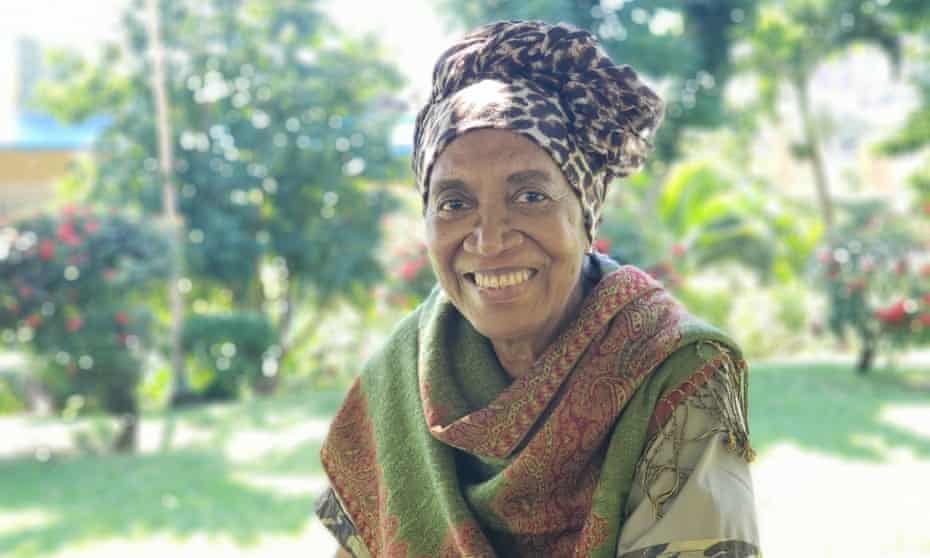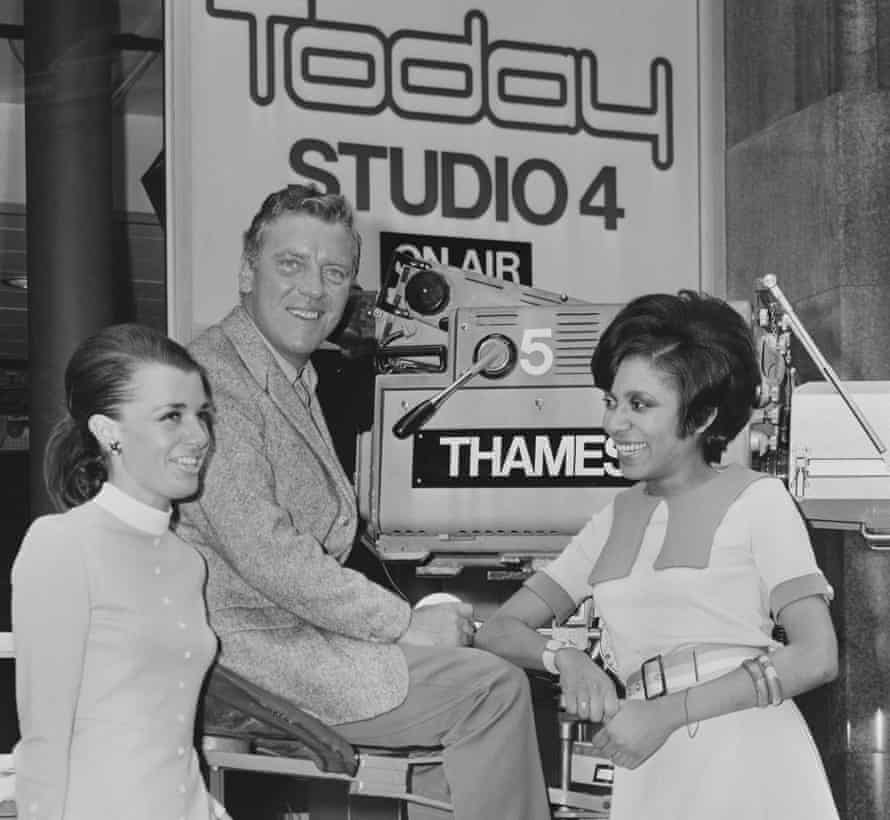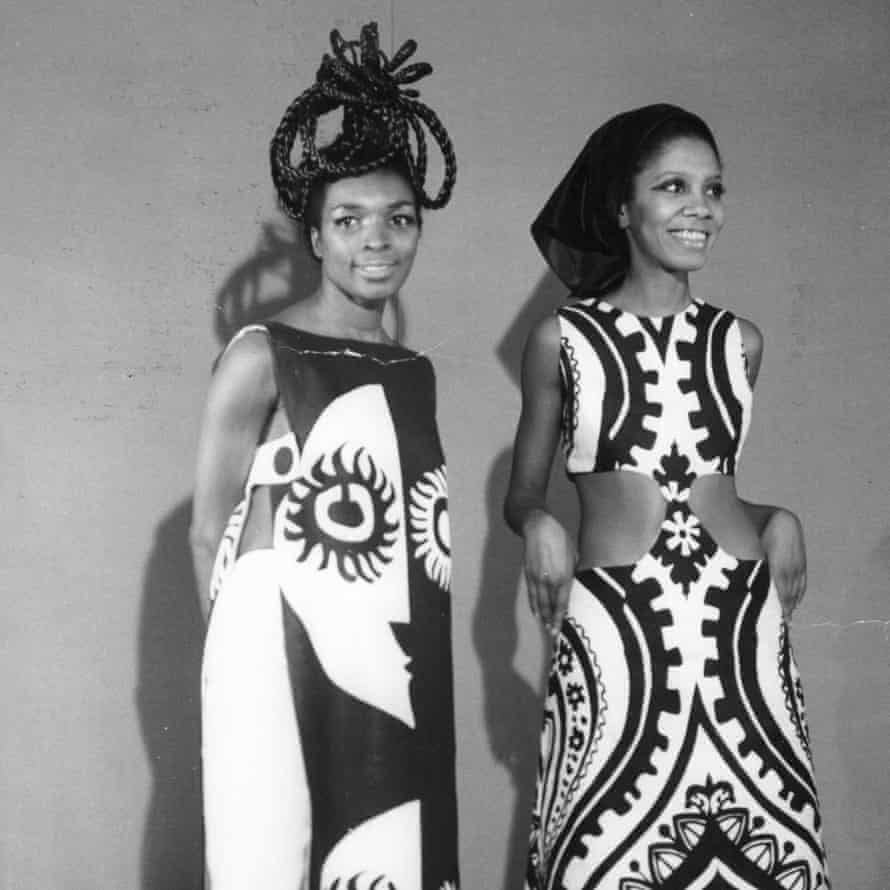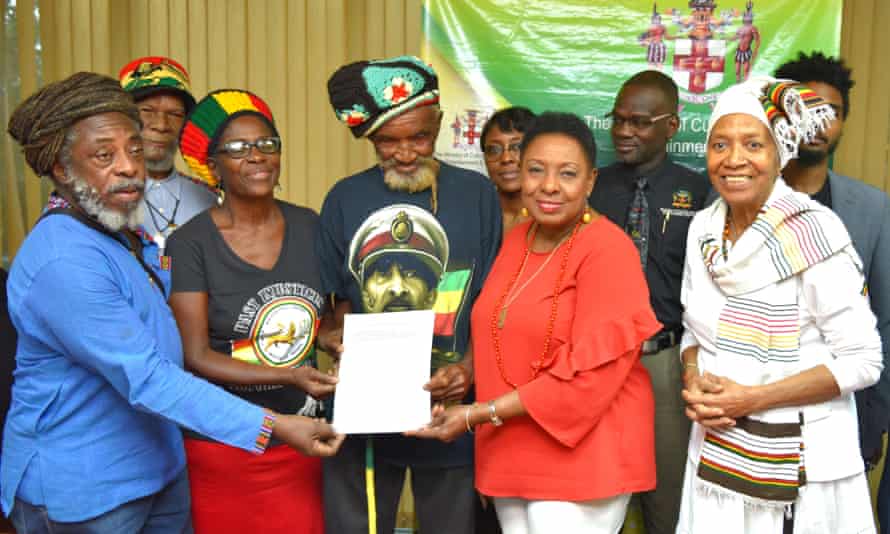
In the 60s, long before Trevor McDonald and Moira Stuart became household names, a 26-year-old from Jamaica was a regular on the news. Then the racist letters and calls started
n 2008, Barbara Blake-Hannah sat down to write a letter of admonishment to the Guardian. “I must put history right,” she wrote, explaining that a poster issued by the paper was incorrect. It contained, she noted, the common misconception that Trevor McDonald was the first Black person to report the news on British TV after he joined ITN in 1973 and that Moira Stuart, on BBC News from 1981, was the first Black woman. In fact, said Blake-Hannah – an author, film-maker and former Jamaican senator – in 1968 she was one of three Thames Television on-camera reporters for the current affairs programme Today, presented by Eamonn Andrews. (The BBC had hired a Black trainee reporter, Eric Anthony Abrahams, a few years earlier.)
She reported five days a week, on everything from the closing-down sale of the Beatles’ Baker Street shop (“They gave away everything in the store, so you can imagine the riot”) to gang crime in the East End of London. But, after nine months, the producers told her abruptly that they would not be renewing her contract. Why? Because of the numerous calls and letters from viewers objecting to a Black person on TV. “It broke my heart,’” she says.
Blake-Hannah is speaking to me from her home in Kingston, Jamaica, where she settled in 1972. She embraced Rastafari; the straightened, Vidal Sassoon-style bob of her 60s TV appearances has long been replaced by a leopard-print headwrap. Her only child, Makonnen Hannah, is nearby – he made headlines globally in 1998 when, as a 13-year-old, he was appointed the youngest-ever adviser to Jamaica’s Ministry of Commerce and Technology.

It was never about the pool. The family had access to a pool and Blake-Hannah and her sister swam every morning. They were attended to by a cook, a gardener and a nursemaid and had places at the prestigious boarding school Hampton, alongside the daughters of the Caribbean elite. “There were 100 girls, only 10 of whom were Black, of whom my sister and I were the ‘blackest’,” she says.
The young Blake-Hannah’s expensive education ended prematurely, however, just after her O-levels. “By then, my father’s finances had collapsed. He took me out and put me in secretarial school. I wept bitter tears, but it really turned out to be most useful.” By the time Blake-Hannah accepted a job offer in Britain – a bit-part in the 1965 film A High Wind in Jamaica, starring Anthony Quinn – her work experience already included journalism, copywriting for an advertising agency, hosting a TV quizshow, appearing in a pantomime and a spot of modelling.
It was a good life, but she felt drawn to the “mother country”. “I’d been educated to be a Black Englishwoman. I could tell you the average rain rate for all of the Lake District and recite Wordsworth’s poem to daffodils. I spoke and wrote perfect English and I thought: ‘Well, apart from the disadvantage of brown skin, kinky hair and a broad nose, I would be quite OK, y’know?’”
Britain did not offer the warm Commonwealth welcome she had hoped for. “The contempt was so visible all the time; that was a real shock,” she says. A shock, but hardly a surprise. “Slavery already taught us that, y’know? The white man will have contempt: you are his inferior and he doesn’t have to like you. So you’re kind of prepared. Or, at that time in the development of Black people in the world, that was our attitude.”
The practical difficulties, however, were a shock. “Trying to get accommodation is really where it hit home,” she says. “No one would rent you anywhere decent. You had to be prepared to have the worst accommodation, in the worst parts of town.” In the end, she could find only a room in a house where she had to share the single bathroom with two families from India. “It was really awful to have to put up with life under those conditions,” she says.
Work was easier to come by, although she had to start at the bottom. After a succession of temporary secretarial jobs, Blake-Hannah got a position at the PR company employed in the UK by Jamaica. In time, she began writing for the Sunday Times and felt herself embraced by a community, alongside the expat West Indian one.
“I had a very good girlfriend – Celia Brayfield, who became a bestselling author – and we’d go to the parties that the Sunday Times and other journalists would give,” she says. Was she the only person of colour within that media circle? Probably, but the thought never occurred to her. “It was an artistic community; that was colourless, y’know? It didn’t matter. The Beatles had just gone to India, good heavens! So everybody was dressing in Indian clothes. It was a multicultural melting pot.” It offered respite from discrimination elsewhere. “You were aware of racism at all times. I think it was just this circle of people who had no hang-ups, no prejudices, that made life not too difficult.”
By the mid-60s, the Black liberation movement was well under way, yet somehow it felt far removed from Blake-Hannah’s life in London. “The revolution was something that was happening in America,” she says. “‘Black is beautiful’, Black power, Malcolm X, Stokely Carmichael; our Black brains started ticking over because of them, but the Black community on Ladbroke Grove was a place you tried your best to get away from, because you knew it was really the bottom and you weren’t accustomed to that; I certainly wasn’t.”
It would take several more years – and a Rastafari awakening – before Blake-Hannah began to consider her place in this revolution. She moved in different circles to the activists such as the Mangrove nine, who were arrested for protesting against police harassment of the Mangrove restaurant in Notting Hill and then fought a landmark legal battle to highlight racism in the criminal justice system. “People asked me the other day if I was part of the Mangrove uprising. Mangrove was happening at the same time as I had my PR job. I took people to lunch, y’know, at restaurants on Kings Road. I didn’t take clients to lunch at the Mangrove.”

When conducting interviews in public, she was shielded from much of the prejudice, if only because most people were flattered by the presence of a camera. “I put that down to the fact that people like to be on television. It doesn’t matter who’s asking them the questions,” she says. But being a journalist couldn’t protect her from racism within the media. “I remember a job in Birmingham; they asked me one morning: ‘Well, Barbara, if Black people are so great, how come they didn’t paint the Mona Lisa?’” She was speechless. “I didn’t have an answer. I didn’t know there was anything to compare to the Mona Lisa. I thought that Egypt was Elizabeth Taylor in Cleopatra, y’know? I didn’t know anything about Africa. Except that we had come from there as slaves. That’s all I knew.”
One day in 1968, she was sent to report at the Houses of Parliament. “I remember being on a bus and passing by South Africa House in Trafalgar Square and white people using the N-word and shouting up at my face in the bus: ‘Go back home.’ This was the year of the bill proposing amendments to the Race Relations Act 1965, making it illegal to refuse housing, employment or public services on the grounds of race. In March, Enoch Powell had delivered his infamous “Rivers of Blood” speech in objection to the bill. For Blake-Hannah, the timing of her dismissal from Today that year is significant. “Thames Television had a good opportunity to act on the Race Relations Act and they didn’t. They decided to continue the racism. I didn’t know it at the time – I couldn’t say anything – but, looking at it now, it was really wrong. They could easily have said [of the racist complaints]: ‘We don’t care.’” After being let go in such a manner, she says: “I realised there was no space for me in Britain.”
She did find another job in TV, at Associated Television in Birmingham, but unrelenting racism interfered again with her work. No accommodation near her new job would accept a Black tenant, so she was forced to undertake an exhausting daily commute from London. In her 2008 letter to the Guardian, she recalled how she had to “listen without reacting when the production staff asked: ‘What ‘wog’ story are we doing today?’” On another occasion, she wrote, Powell agreed to do an interview with the station “on condition that ‘the Black girl’ was not there”.

A few years later, she was asked to do PR for the Jamaican film The Harder They Come. She decided to leave the UK. “The entire population of Jamaica tried to get into the cinema that premiere night. When the show was over, the best party I’ve ever been to in my life was held by the Jamaicans. I couldn’t wait to get back home … I did not look back.”
What she did on her return was enough to fill many books – and illustrates just how much Britain lost. She produced several films, including the 1982 Channel 4 documentary Race, Rhetoric, Rastafari, and several books, including a 2010 memoir covering her time in Britain and an influential manual on home schooling. In 1984, she was elected as an independent senator, becoming the first Rastafarian to serve in the Jamaican parliament. She has always kept abreast of British news and now campaigns against what she calls “heartless” Home Office deportations to Jamaica – which Priti Patel, the home secretary, last week promised to make a “regular drumbeat” of British life.
Blake-Hannah tells the story of Treymane Brown, a 25-year-old who left Jamaica for the UK as a six-year-old and was separated from his own six-year-old son when he was deported in 2017. While homeless in Jamaica, Brown saved a young boy from drowning in a gully. “All they could do was give him a hero’s award. He still has no job, no money and nowhere to live. None of them do. None of them have any connection with Jamaica except their genes.”
What shocks her most, however, is how little the British media have changed in the 50 years since she was sacked, lest the shade of her skin offend racists. “When Meghan [the Duchess of Sussex] was still in Britain, you’d see a story and go into the comments section … I could see into the minds of the people who would call in [to Today] and say: ‘Get that N-word off our screens!’ Those people still exist in Britain today.”
Whether it is supermarkets’ TV adverts, Black Lives Matter-themed dance performances or breakfast news presenters being disciplined, it often seems the racists in the audience complain louder and have their feelings considered more than the non-racist majority. “You know why? British people have never been taught the full story of their history … the Queen of England is a nice old lady, nuff respect, but when I see Colston’s statue toppled and I read the history of the Royal African Company … You all need to know your history! That will stop the arrogance and that will stop the racism.”
Her own place in that history is being reclaimed. This year, the annual British Journalism awards awarded the inaugural Barbara Blake-Hannah prize to the Independent’s Kuba Shand-Baptiste. The award for up-and-coming minority ethnic journalist also had the coolest prize – to fly out to Jamaica to meet Blake-Hannah. She is also part of Britain’s Black History Month curriculum and has received various lifetime achievement awards and an Order of Distinction from the Jamaican government. But the journalism award is, she says, particularly meaningful: “Every year, I will be remembered by all these beautiful Black, brown, Asian journalists. I am so honoured.”
The advice she has for the recipients is the same as that for all who follow in her footsteps: “Learn your history. Don’t be like Barbara Blake when they said: ‘If Black people are so great, how come they never painted the Mona Lisa?’ Have an answer, because somebody’s gonna ask you. And then teach them something. Come into work one morning and say: ‘Hey, do you know that it’s Usain Bolt’s birthday today?’ Just once in a while, say something Black.”
No comments:
Post a Comment